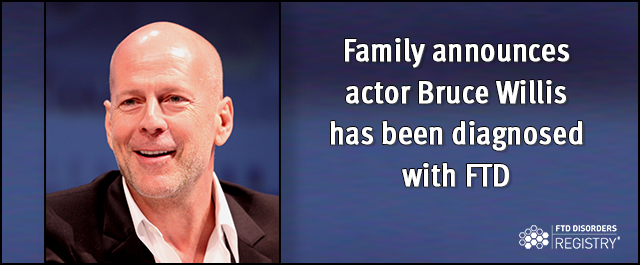PRESS & NEWS
Actor Bruce Willis is Diagnosed with Frontotemporal Degeneration (FTD)

The family of actor Bruce Willis issued a statement on Thursday, February 16, 2023, that his aphasia condition has progressed to frontotemporal dementia (also known as frontotemporal degeneration or FTD).
The family of actor Bruce Willis issued a statement on Thursday, February 16, 2023, that his aphasia condition has progressed to frontotemporal dementia (also known as frontotemporal degeneration or FTD).
“Ours is just one family with a loved one who suffers from FTD, and we encourage others facing it to seek out the wealth of information and support available through AFTD,” the family said in the statement shared through the Association for Frontotemporal Degeneration (AFTD).
Born Walter Bruce Willis on March 19, 1955, he has been called one of the all-time greatest actors in America. He has appeared in more than a hundred movies that have spanned many genres including action, comedy, cult, drama, fantasy, horror, Indie, mystery, sci-fi, supernatural, and suspense. He is best known for the character of John McClane in the "Die Hard" movie series.
Throughout his 40-plus-year career he has won many of the awards for which he was nominated covering both movies and television including:
Willis, 67, retired from acting on March 30, 2022, after receiving the aphasia diagnosis, which can affect speech and the ability to understand language.
FTD is a group of progressive, fatal, neurological diseases that affect the frontal and/or temporal regions of the brain. It can cause changes in behavior, thinking, language, and movement, with symptoms worsening and changing over time. The average life expectancy is 7 to 13 years after symptoms begin.
As a rare disease, few have heard about FTD. In a 2019 report, 60 Minutes correspondent Bill Whitaker called it “The Cruelest Disease You’ve Never Heard Of …”
While there are no approved treatments or cures for FTD, research is more active than ever. Clinical trials are testing the safety and effectiveness of experimental medicines, with the hope of helping with symptoms or slowing progression for some causes of FTD. Researchers around the globe are studying the different causes of FTD and creating tools for diagnosis and care.
At the FTD Disorders Registry, our hearts go out to the Willis family and to all families who experience FTD. The FTD Disorders Registry advances hope by learning from those with lived experience to share their insights with researchers and by informing people about clinical trials and other research in need of volunteers. Learn more at www.FTDregistry.org.
“Bruce always believed in using his voice in the world to help others, and to raise awareness about important issues both publicly and privately,” the family said in the statement. “We know in our hearts that – if he could today – he would want to respond by bringing global attention and a connectedness with those who are also dealing with this debilitating disease and how it impacts so many individuals and their families.”
Together we can find a cure for ftd
The FTD Disorders Registry is a powerful tool in the movement to create therapies and find a cure. Together we can help change the course of the disease and put an end to FTD.
Your privacy is important! We promise to protect it. We will not share your contact information.



